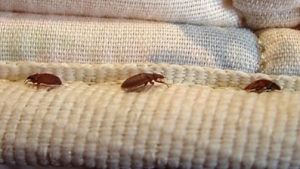1/14/2012 Scientists Find New Ways To Kill Bedbugs
FEW things destroy the reputation of a high-class hotel faster than bed bugs. These vampiric arthropods, which almost disappeared from human dwellings with the introduction of synthetic insecticides after the second world war, are making a comeback. They can drink seven times their own weight in blood in a night, leaving itchy welts on the victim’s skin and blood spots on his sheets as they do so. That is enough to send anyone scurrying to hotel-rating internet sites—and even, possibly, to lawyers.
New York is worst-hit at the moment: neither five-star hotels nor top-notch apartments have been spared. But other places, too, are starting to panic. Hotel staff from Los Angeles to London are scrutinising the seams of mattresses and the backs of skirting boards, where the bugs often hide during the day, with more than usual zeal. But frequently this is to no avail. Bed bugs are hard to spot. Even trained pest-control inspectors can miss them. What is needed is a way to flush them into the open. And James Logan, Emma Weeks and their colleagues at the London School of Hygiene and Tropical Medicine and Rothamsted Research think they have one: a bed-bug trap baited with something the bugs find irresistible—the smell of their own droppings.
The reason the bugs are attracted to this smell is that they use it to navigate back to their hidey-holes after a night of feeding. To develop the bait for the new trap, Dr Weeks therefore analysed the chemicals given off by bed-bug faeces and attempted to work out which of the components were acting as signposts. She did this by puffing air collected from a jar containing bed-bug faeces into a machine called a gas chromatograph, which separated the components from one another, and then through a mass spectrometer, to identify each component from its molecular weight. Having found what the smell consisted of, she wafted the chemicals in question, one by one, at bed bugs that had their antennae wired up to micro-electrodes, to see which of them provoked a response.
The result, the details of which the team is keeping secret for the moment for commercial reasons, is used to bait a trap, designed by Dr Logan, that is about the size of a standard mouse trap and has a sticky floor similar to fly paper. And it works. To paraphrase the slogan of Roach Motel, a brand of traps aimed at a different sort of insect pest, bed bugs check in, but they don’t check out.
The new trap could be used both to assess whether a hotel room or apartment is infested and also to kill the insects without dousing everything in insecticide—which is, in any case, an increasingly futile exercise, as many have now evolved resistance. Ralph Waldo Emerson, a 19th-century American sage, is supposed to have said that if a man built a better mousetrap than his neighbour, the world would make a beaten path to his door. Dr Logan and Dr Weeks are about to find out if the same thing applies to bed-bug traps.
Continue Reading More: Scientists Find New Ways To Kill Bedbugs



























